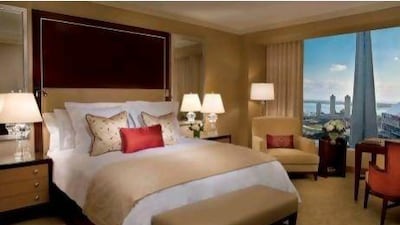The welcome
A doorman wearing a bowler hat, named Guillermo, greets me with a big grin at the entrance and remembers me by name for the rest of my stay. I'm a little underwhelmed by the small lobby, which feels a bit like an office tower's, decorated with Canadian artwork and bronze maple leaves inlaid in the cream marble floors. But I'm only there for a moment before I'm shown up to the Club Level lounge, where I'm easily checked in and briefed by Jordan, one of the concierge team.
The neighbourhood
You can't be more central than the hotel's spot on Wellington Street, between the tram line on Spadina Avenue and the metro line on University Avenue. The glass tower stands tall in the middle of the entertainment district, a walk from CN Tower and the Rogers Centre sports stadium, and close to the Toronto International Film Festival's shiny new headquarters, the Bell Lightbox, which, with the new Ritz-Carlton, made that strip the new place to be for festivalgoers last September.
The room
My lake-view deluxe room is simply decorated in various tones of beige, which is just fine because nothing should take away from the most magnificent view of the CN Tower, which fills the centre of my floor-to-ceiling window, and Lake Ontario beyond it. The bed has the dreamy comfort I've come to expect from the Ritz-Carlton, with Italian Frette sheets. In the spacious marble bathroom, the floors are heated (a bonus to help you through a Canadian winter) and there's a TV embedded behind the mirror. It's stocked with all the usuals, plus a Bose sound system and Nespresso maker.
The service
Smoothly efficient and friendly, everyone from the doorman to the Club lounge staff stops to make conversation in a way that feels caring but not intrusive.
The food
The hotel's signature restaurant, TOCA by Tom Brodi, serves inventive Canadian dishes with local ingredients sourced from coast to coast, such as Nova Scotia lobster and glazed British Columbia black cod. But they had me at the Avocado Frites with Tarragon Remoulade (C$9; Dh32): the avocado was perfectly fresh and firm despite being deep-fried in batter. After polishing off my very tender Wellington County Petit Mignon, aged 36 days (C$32; Dh475), I must find room for the highlight - a visit to the Cheese Cave, where the restaurant's "affineur," a trained cheese sommelier, helps select a tray of cheeses from her selection of more than 200.
The scene
After its opening earlier last year, the Ritz-Carlton became the new nucleus for celebrities at the film festival, including George Clooney and Ryan Gosling. It's understandably less flashy when I visit: the weekend crowd consists of well-dressed couples on vacation, Bay Street financiers and the odd artiste at the bar in the lobby.
Loved
It was the thoughtful extras that made a difference: takeaway cups provided in the room for your coffee; a minibar stocked with handwarmers available for purchase along with gourmet Canadian snacks like Thomas Haas chocolates; and a nightly relaxation tip from Yogagurl, the Ritz-Carlton Spa's in-house yoga studio. Not to mention the affineur.
Hated
There is nothing wrong with the decor, but there isn't anything spectacularly right about it either, although I did like TOCA's wood-planked elegance.
The verdict
A solid bet for those who want to be surrounded with no-nonsense luxury in the heart of the city with a smashing view and one of the city's hotspot restaurants.
The bottom line
A double room costs from C$390 (Dh1,400) per night, including taxes. The Ritz-Carlton, 181 Wellington Street West, Toronto (www.ritzcarlton.com/toronto; 001 416 585 2500).

